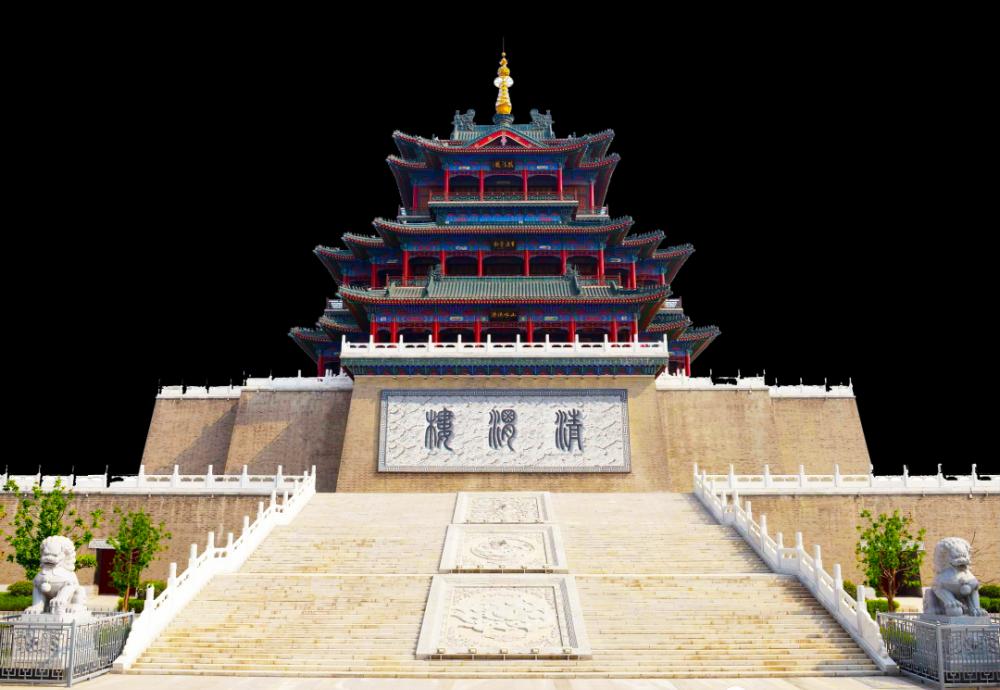Complement each other
The poems and the buildings shine together
Poetry is passed down through the building
Lou is named after the poem
clear
Wei
floor
poem
word
Famous buildings

History of Qingwei Building
Qingwei Tower is an important landscape in the history of Xianyang Ancient City, it was originally built in the Qin Dynasty, named Xianyang East Building, and renamed Xianyang Tower during the Han and Tang Dynasties. Before the Song Dynasty, the Xianyang Building fell into disrepair. During the reign of Emperor Renzong of Song (1034-1037 AD), the Northern Song Dynasty poet Huang Xiaoxian, who was rebuilt during the reign of ZhiXian county in Xianyang, was titled " Qingwei Lou " . The historical Qingwei Tower is as famous as the Yellow Crane Tower, the Stork Tower, and the Yueyang Tower.
Poetry Appreciation
"Left Title Qingwei Building"
【Song Dynasty】 Huang Xiaoxian
Huang Weng loves the mountain without rest, and does not go down to the Qingwei Building every day.
For the officials to fall into hiding, love the mountain can not swim in the middle of the mountain.
It is better to look at the mountains in the twilight, and the ancients and today are empty and old.
Born to be immutable, the white clouds are leisurely in the arms.
After the Northern Song Dynasty poet Huang Xiaoxian built the Qingwei Tower, he boarded a panoramic view, looked at the south of the Cui Ridge, looked north at the Biyuan Tomb, the Weishui river flowed through his feet, and the ancient ferry was close at hand, so he wrote the famous poem "Leaving the Title qingwei Lou" that was repeatedly recited for posterity.
Poet Profile
Huang Xiaoxian
Huang Xiaoxian, zisi, was born from a famous family in Pucheng County, Fujian Province, and was a poet of the Northern Song Dynasty. Song Renzong Tiansheng second year jinshi. Huang Xiaoxian was an official all his life, just and straight, loved the people like a son, and everyone was well-known. Zi Yue: "Those who know are not confused, and those who are benevolent are not worried."
Huang Xiaoxian worked hard all his life, worked tirelessly, and wrote poetry while serving as an official in politics; by the time of the Qing Calendar and the Imperial Period (1041~1053), he was already known to be able to write poetry. People know the name of Huang Zisi's poems, and when reciting his poems, whenever they get a good sentence, they always have to experience it many times and understand the profound meaning from it. Therefore, when Su Shi commented on his poems, he compared him with Wei Yingwu and Liu Zongyuan, pointing out that his poems have the characteristics of "beauty is outside of saltiness and acid" as Sikong Tu said, and it is "possible to sing and sigh three times".
Poetry Appreciation
This lyric poem by Huang Xiaoxian fully expresses the attitude of a benevolent person who loves mountains and is not happy. In terms of writing, it reflects the characteristics of Song Shimei not being in the light but caring about the state, and the taste is not heavy fat and pus, but heavy and timeless, which is very representative.
In the fifth year of the Northern Song Dynasty (1106), when Wu Xiu was the chief bookkeeper of Xianyang County, he made a very high evaluation of this poem: "High and interesting, floating from the sky"; he also invited the calligrapher who was good at writing at that time to put the big book into the stone. This is the famous "Song HuangXiaoxian Poetry Stele" in the history of "Liu Zhi". The degree of fame of Huang Gongshi's poems, to the extent that anyone who knows qingwei lou can generally recite the first four sentences of this poem casually.
Qingweilou Fine Arts Museum
Editor: Kong Xiaoyan
Review: Yang Xiangxiong